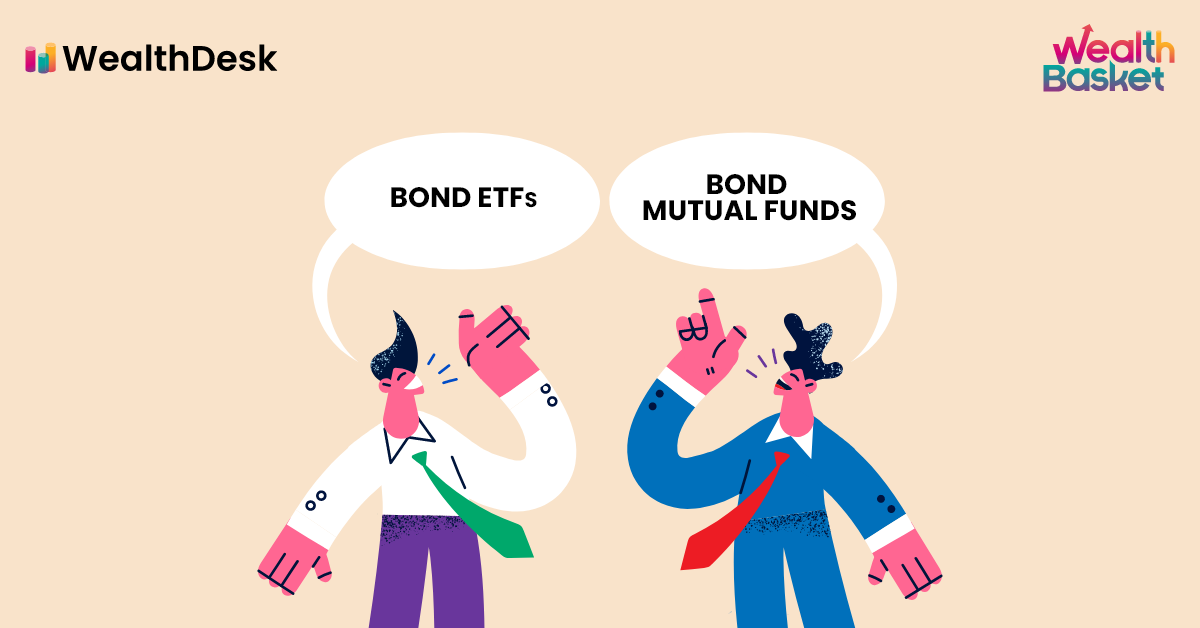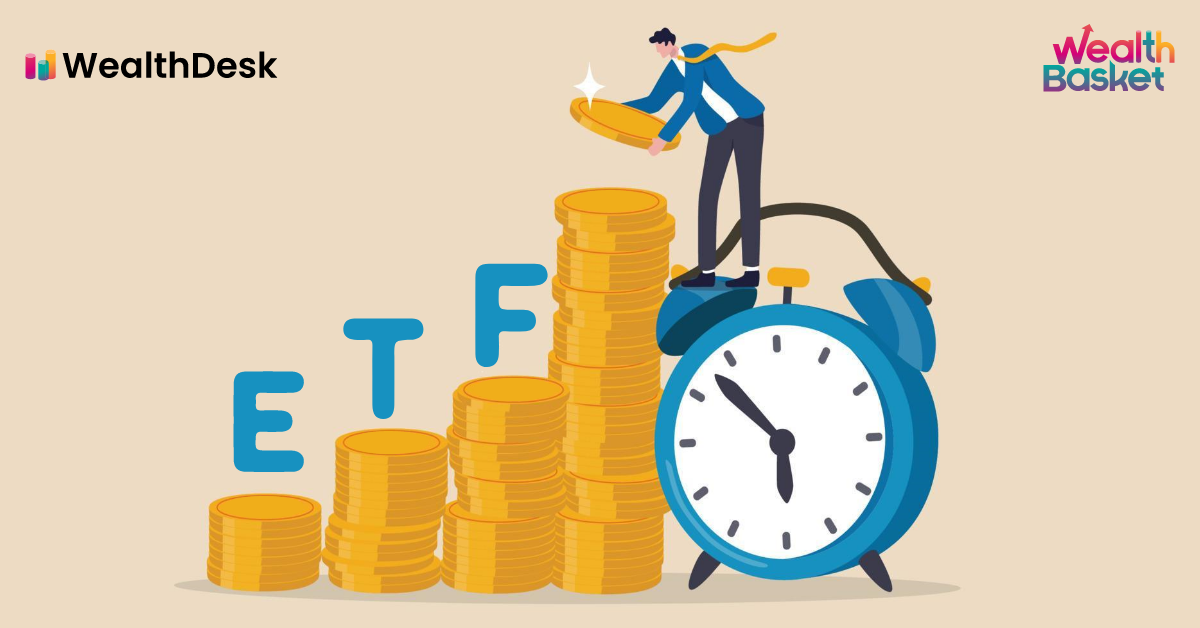While India’s gold Exchange Traded Funds (ETFs) experienced significant withdrawals in January and February, the category’s net assets under management (AUM) increased to ₹18,727 Cr in February.
Today, when you have multiple options to invest in gold through physical purchase, ETFs, stocks, bonds, and mutual funds, you need to consider what purpose each one serves carefully.
Through this article, we attempt to highlight fundamental differences between gold mutual funds and gold ETFs, some of the most popular options to invest in gold in India, along with an analysis of their performance and returns.
What is a Gold ETF?
Gold ETFs track the local gold price and duplicate its performance. You can use the gold ETF to invest in a place of physical Gold. Actual gold investments may be time-consuming and risky, and gold ETFs allow you to hold yellow metal without owning them physically.
One gold ETF unit equals one gram of gold which is the minimum purchase requirement for gold ETFs.
Gold ETF Returns
The performance of gold ETFs depends on the price of yellow metal in domestic markets. Gold ETF investments will have no exit or entry load, appealing to investors. In February, global gold ETFs saw net inflows of 35.3t ($2.1 billion, or 1% of AUM). In India, the AUM of digital gold investments in 2021 has climbed by 27% by December 2021 since January 2021.
Gold ETF returns in India in the last year (derived as of 14th Mar 2022)
| Gold ETFs | Last 1 Year Returns |
| SBI Gold ETF | 20.8% |
| HDFC Gold ETF | 20.6% |
| ICICI Prudential Gold ETF | 20.7% |
| UTI Gold ETF | 20.5% |
| Axis Gold ETF | 20.6% |
Gold ETF Advantages
Let’s explore why gold ETFs could be the right investment option for you:
- Gold ETFs are stored electronically and hence, do not require storage arrangements from your end.
- Gold ETFs trade on stock exchanges, and you can trade them in real-time.
- Gold ETFs have high liquidity; investors can easily withdraw from the investment or access funds.
- Gold ETF charges are lower than the cost of purchasing, holding, selling, and ensuring gold in its physical form.
Risks of Investing in Gold ETFs
As an investment option, Gold has exhibited exponential growth only when the economy is unstable. The metal’s gleam is inversely related to the economic scenarios. When Covid-19 hit the world, gold reached an all-time high. Historically, sentimental value has fuelled gold demand, which gold ETFs fail to justify.
- They have a market volatility risk since they are traded on the stock exchange.
- Some gold ETFs may be illiquid and restrict you from buying or selling them.
- Gold ETFs have various charges such as fund management costs, brokerage fees, and commission fees charged on you; hence, their returns are slightly less than the price in the market.
Discover stocks that suit certain filter criteria and dive into details to check their WealthBaskets.
What is a Gold Mutual Fund?
Gold mutual funds invest in gold mining companies, gold bonds, gold ETFs, or gold. Gold funds have a fund manager who makes investment decisions depending on the fund’s objectives.
Furthermore, the overall gold market price movement influences the fund’s Net Asset Value (NAV).
These commodity mutual funds invest in gold-producing firms or gold bullion, including physical gold bars and coins. If the fund invests primarily in bullion or stocks and bonds of gold manufacturers and miners, the value of the shares inside these funds will be heavily influenced by the market price of gold.
Gold Mutual Funds Returns
The return on top gold mutual funds in India (as of 22nd March 2022)
| Fund | 1 year Return |
| Aditya Birla Sun Life Gold Fund | 13% |
| Invesco India Gold Fund Growth | 13.3% |
| Axis Gold Fund Growth | 12.7% |
| HDFC Gold Fund Growth | 13.2% |
| SBI Gold Fund Growth | 13.2% |
Gold Mutual Fund Advantages
- You can purchase gold mutual funds without a Demat account.
- Investing in gold mutual funds gives investors easy access to the gold asset.
- Gold funds can be used to protect against geopolitical risk and inflation.
- It’s a straightforward method for diversifying your investment portfolio.
Gold Mutual Fund Risks
Gold Funds aren’t free of drawbacks. We have a few listed below:
- Gold is the denomination of the US dollar; the rise and fall of the US dollar cause gold prices to fluctuate.
- Gold MFs are expensive since they are actively managed and require frequent portfolio rebalancing to outperform the benchmark.
- Some gold MFs may not invest in gold instead of gold mining companies.
- Gold mutual funds may not allow you to sell your MFs anytime you want as they may carry exit loads and other restrictions.
Key Differences Between Gold ETF and Gold Mutual Funds
| Parameters | Gold ETFs | Gold Mutual Funds |
| Minimum Investment Amount | Close to the price of 1 gram of gold | ₹1,000 (as a monthly SIP) |
| Management Costs | Lower management cost | Higher management costs because gold mutual funds invest in gold ETFs, so investors are charged management fees from both the mutual fund and the ETF |
| Liquidity | Easy to buy or sell on exchanges during market hours | Can only be sold back to the asset management company after market hours |
| Mode of investment |
1. Lump sum investments 2. Do-It-Yourself SIPs |
1. Lump sum investments 2. SIPs |
| Demat account | Needed | Not needed |
| Exit load | Not charged | Charged if redeemed before 1 year |
| Conversion | Can be converted into physical gold | Can not be converted into physical gold |
Conclusion
Gold ETFs and gold funds have advantages and disadvantages, but ETFs monitor gold prices and gold funds invest in gold mining companies. Before making a selection, you should investigate the performance of ETFs and gold mutual funds.
Also, while selling your gold investments, consider the expenses and tax ramifications. Investing in gold ETFs rather than actual gold or gold funds may provide a superior long-term approach for gold accumulation.
At WealthDesk, we offer you a readymade WealthBasket consisting of stocks or ETFs reflecting an investment strategy or theme designed explicitly by the SEBI-approved investment professionals and make your investment journey hassle-free.
FAQs
As long as you plan to stay invested for a longer time, you can enter the market anytime, and investment benefits are better experienced when made as early as possible.
Due to the low cost, and investment flexibility (real-time trading), ETFs are more convenient and offer good returns. While mutual funds also provide better returns but their expense ratio and other fees can make it a costly investment option.
Unlike physical gold, gold ETFs are not subject to a wealth tax, and storage (in a Demat account) and security are not issues. As a result, you can hold on to your ETFs for as long as possible.


















